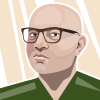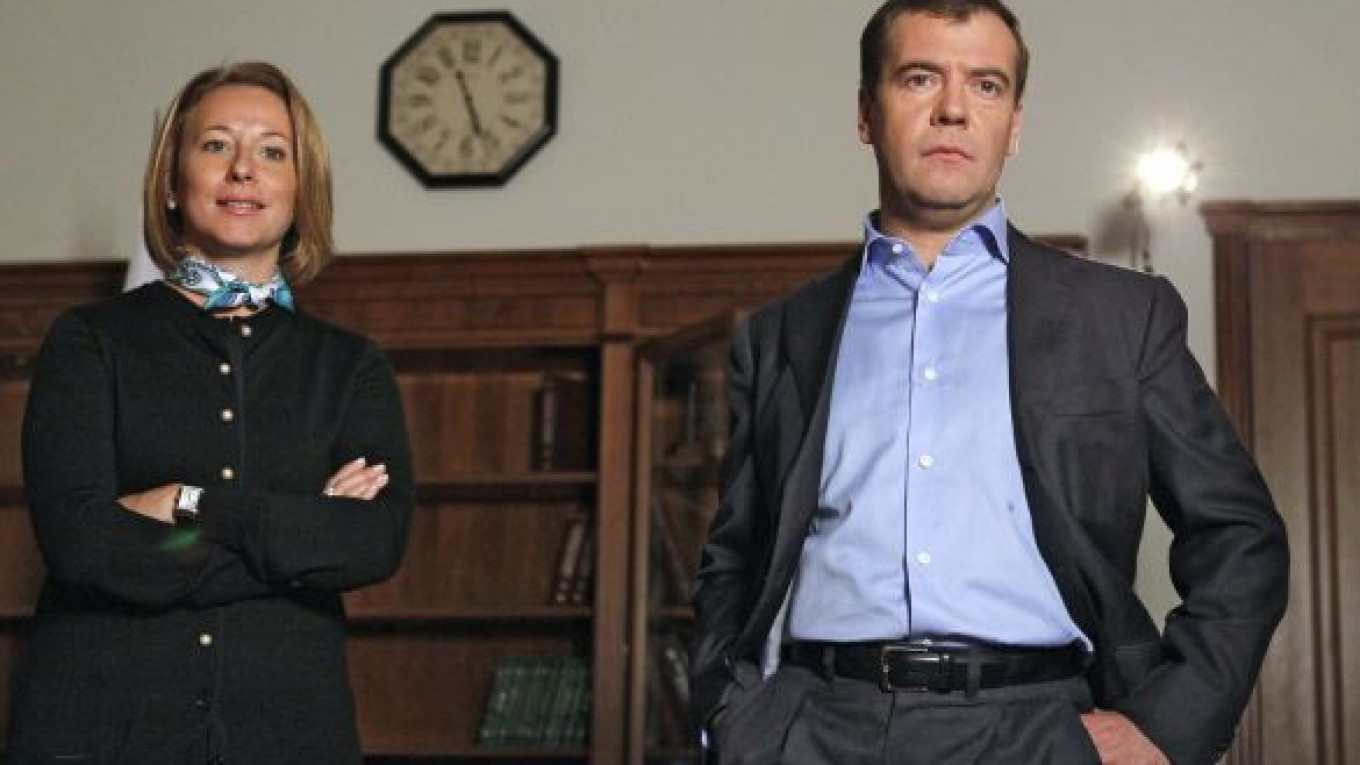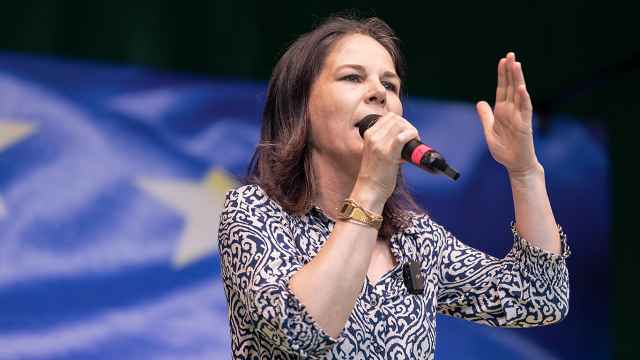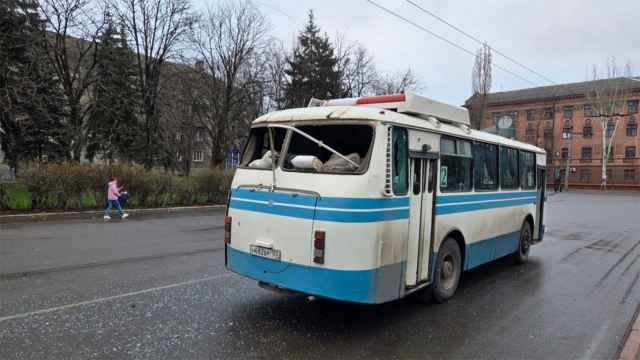President Dmitry Medvedev has warned the ruling United Russia party that the country risks falling into stagnation without more political competition, the second such call from the Kremlin in a week.
In a video posted to his blog late Tuesday, Medvedev said that under his leadership over the past two years, the political system has slowly reformed toward cleaner elections and greater inclusion of small parties.
All political parties, including United Russia, hailed Medvedev's assessment of the political situation on Wednesday, though opposition groups and analysts said the president had not done enough to modernize the political system.
"If the opposition hasn't the slightest chance of winning in an honest fight, it degrades and turns marginal," Medvedev said. "But if the ruling party has no chances to lose anywhere at anytime, it becomes 'bronzed' and ultimately degrades, too."
The phrase — evoking the image of bronze monuments — suggests that those at the top have grown complacent and irresponsive to others' needs. And the timing suggests that the Kremlin is preparing to push harder for a more complex political system.
Vladislav Surkov, deputy head of the presidential administration and the Kremlin's domestic politics architect, predicted on Thursday that United Russia might lose its constitutional majority in the Duma after elections next year.
Speaking during a meeting in Moscow with students from U.S. universities, Surkov said United Russia would grow weaker while opposition will gain strength. Eventually, there will be five parties in the Duma, instead of the current four, he said, without elaborating on when or what the next party might be.
According to a November survey of 1,600 Russians by the Kremlin-friendly VTsIOM polling agency, United Russia will get almost 63 percent of the vote in 2011.
Medvedev's video blog came on the eve of a meeting Wednesday with the leaders of the four parties that have factions in the State Duma. He invited them to his Gorki residence outside Moscow to contribute ideas for his Nov. 30 state-of-the-nation address.
The president singled out the modernization of the public utilities sector and the 2011 budget.
Without naming United Russia, led by Medvedev's predecessor and political mentor Prime Minister Vladimir Putin, the president said in his video blog that the ruling party should not just be an appendix of the executive branch.
Instead, he said, the ruling party should be responsible for forming the executive and must have rights and responsibilities before voters.
Boris Gryzlov, chairman of United Russia's Supreme Council, told reporters after the closed-door meeting with Medvedev that his comments were a call for the party to rotate its personnel.
"We see this demand as a requirement to work in this direction more effectively," said Gryzlov, who has been the public face of his party since November 2002.
Andrei Vorobyov, head of United Russia's Central Executive Committee, told Interfax on Wednesday that the president's message is "absolutely clear" when he says that "absence of competition is a threat."
United Russia, since its inception as the party of power in late 2001, has consistently voted to block smaller political parties and groups from active participation in politics. Senior regional officials, many of them United Russia members, have blatantly inflated the party's results during local and federal elections, sometimes even beyond 100 percent of the votes.
Yury Korgunyuk, a political parties analyst with the Indem think tank, suggested that Medvedev is trying to take over control of United Russia from Putin, by pushing for new blood in the party and for its modernization, even at the expense of a smaller vote that the party — under his measured criticism — would garner in future elections.
"Putin used United Russia to crush everyone in the field of public politics, and that is why it was so fat and heavy. Medvedev feels he may achieve his goals as a leader by subtler ways, and United Russia in its current condition is not a good tool for that," the analyst said.
Neither Putin nor Medvedev has formally joined United Russia, which describes itself as a center-right party.
After a series of scandals over votes manipulated in favor of United Russia in the regional elections last fall, when three other parties walked out of the State Duma in protest, Medvedev demanded that regional authorities stop rigging elections.
He also submitted a raft of legislation aimed at giving parties equal rights to campaign and to ease entry into regional legislative bodies for parties that cannot make it through punitive barriers that reached 10 percent of the vote in some regions.
"We have supported these initiatives, although they put us in more restrictive conditions," said Vorobyov, of United Russia.
Medvedev also said in his video address that his initiatives had "minimized risks of manipulations" during elections.
Among the initiatives are tighter regulation of early-vote and absentee ballots; the introduction of electronic ballot-scanners at 5 percent of the country's polling stations; equal television time for campaigning parties; and allowing parties that collect more than 5 percent of the vote, but less than the 7 percent needed for entry as a faction, to send a representative to a legislative body.
Duma Deputy Speaker Ivan Melnikov, the Communist Party's No. 2 leader, told reporters that Medvedev's assessment of the current political stagnation is correct, but he described the presidential legal initiatives as just a "first small step."
Grigory Golosov, an election analyst with the Geliks human rights think tank, said Medvedev's initiatives do not prevent election officials from stuffing ballot boxes for the ruling party.
The pledge to provide parties with equal access to television is also a sham, since Putin reigns on screens unchallenged, he said.
Medvedev's move to slash the number of signatures needed for a party to participate in elections has little practical value because election officials verify the signatures' authenticity only when they see fit, Golosov said.
"Until there is political pressure on election officials, there will be violations," he added.
Federation Council Speaker Sergei Mironov, who leads the left-center A Just Russia party, and the party's leader in the Duma, Nikolai Levichev, also criticized United Russia's monopoly on power.
Levichev called for faster political reforms and liberalization of election laws.
Emerging from the meeting with the president, the party leaders spoke mostly about social problems they said they had discussed with the president.
The party leaders said Medvedev has no plans to raise the retirement age, that he is keeping an eye on investigations into realty scams that left thousands of homeowners out in the cold, and that he is not considering sacking Krasnodar Governor Alexander Tkachyov.
The Krasnodar leader, whose region also contains the 2014 Olympics host city Sochi, has come under fire for doing little to stop gangs after criminals with ties to local law enforcement killed 12 people in a village there this month.
A Message from The Moscow Times:
Dear readers,
We are facing unprecedented challenges. Russia's Prosecutor General's Office has designated The Moscow Times as an "undesirable" organization, criminalizing our work and putting our staff at risk of prosecution. This follows our earlier unjust labeling as a "foreign agent."
These actions are direct attempts to silence independent journalism in Russia. The authorities claim our work "discredits the decisions of the Russian leadership." We see things differently: we strive to provide accurate, unbiased reporting on Russia.
We, the journalists of The Moscow Times, refuse to be silenced. But to continue our work, we need your help.
Your support, no matter how small, makes a world of difference. If you can, please support us monthly starting from just $2. It's quick to set up, and every contribution makes a significant impact.
By supporting The Moscow Times, you're defending open, independent journalism in the face of repression. Thank you for standing with us.
Remind me later.







